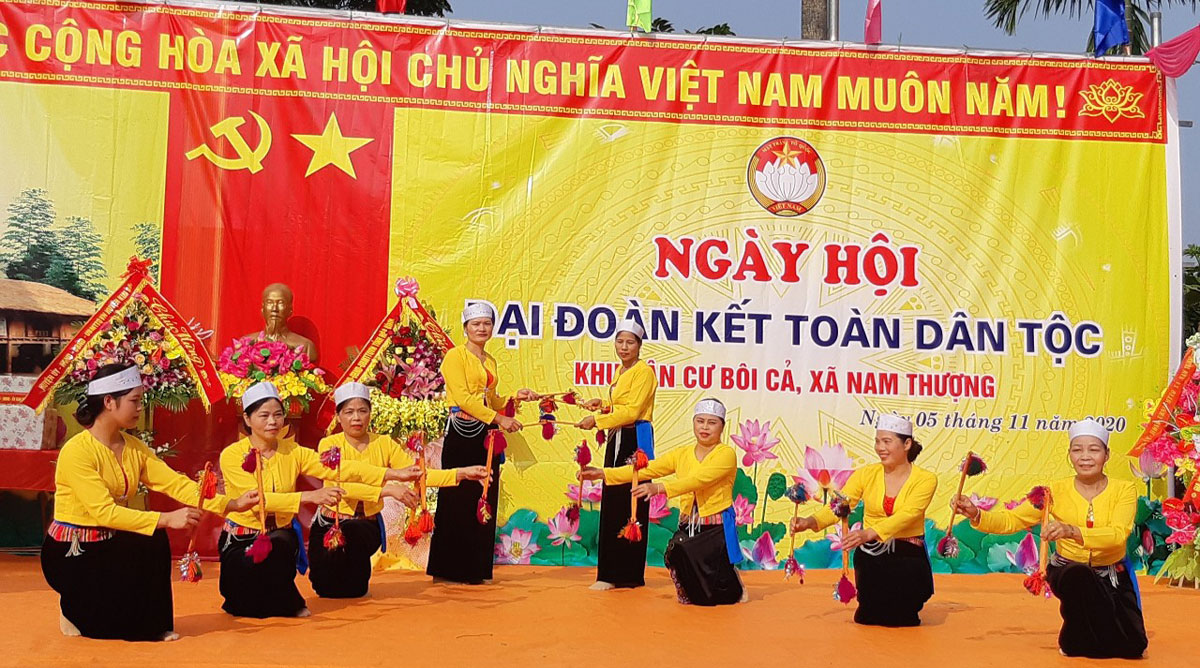
(HBO) - Boi Ca is among the most populous residential areas in Kim Boi district’s Nam Thuong commune. It has eight residential clusters of 362 households grouping 1,607 people. Both Muong and Kinh people live here, with the former accounting for 92 percent of the total local population.

Locals in Boi Ca stage a musical performance at the 2020 great national solidarity festival.
The locals have been encouraged to join a
campaign on the conduction of new-style rural building activities every
Saturday. So far this year, local households have donated 520 working days to
build 0.9km of rural roads and upgrade the commune’s cultural house, giving the
area a facelift.
Boi Ca residents have also seen their
living standards significantly improved thanks to their new development
orientations that focus on agricultural services and transport and
establishment of local teams of construction workers and carpenters. In 2020,
the local per capita income is estimated at 40.5 million VND (1,750 USD), up
5.5 million VND from last year. The number of poor households dropped by 16
from last year to only 4, or 1.1 percent of the local population.
Civilised lifestyle, meanwhile, has been
promoted, with locals adhering to the residential area’s regulations on the
organisation of wedding ceremonies, funerals, and communal festivals. Each
household has access to sanitised water sources; no one dumps garbage at public
places; and prostitution and gambling have been eradicated from the area. In
2020, the area, having 80.9 percent of households recognised as civilised
families, was accredited as civilised site.
With an increasingly vibrant and widespread emulation movement aimed at building cultured residential areas and cultured families, Yen Thuy District has been making steady progress toward improving both the material and spiritual well-being of its people, while fostering a civilized, prosperous, beautiful, and progressive community.
Once lacking recreational spaces and community facilities, Residential Group 2 in Quynh Lam Ward (Hoa Binh City) has recently received attention for the construction of a new, spacious, and fully equipped cultural house. The project followed the model of state support combined with public contributions in both labor and funding.
The "All people unite to build cultural life" movement, which has been effectively integrated with Kim Boi district’s socio-economic development goals, is fostering a lively spirit of emulation across local residential areas, hamlets, villages, public agencies, and enterprises. In addition, through the initiative, traditional cultural values are being preserved and promoted, while community solidarity and mutual support in poverty reduction and economic development are being strengthened.
A working delegation of the Hoa Binh provincial People’s Committee led by its Permanent Vice Chairman Nguyen Van Toan on June 11 inspected the progress of a project to build the Mo Muong Cultural Heritage Conservation Space linked to tourism services in Hop Phong commune, Cao Phong district.
Born and growing in the heroic land of Muong Dong, Dinh Thi Kieu Dung, a resident in Bo town of Kim Boi district, in her childhood was nurtured by the sweet lullabies of her grandmother and mother. These melodies deeply imprinted on her soul, becoming an inseparable part of her love for her ethnic group's culture. For over 20 years, this love for her hometown has driven Dung to research, collect, and pass down the cultural values of the Muong people to future generations.
In the final days of May, the Ethnic Art Troupe of Hoa Binh Province organized performances to serve the people in remote, mountainous, and particularly disadvantaged areas within the province. These were not just ordinary artistic shows, but they were the meaningful journeys aimed at spreading cultural values, enhancing the spiritual life of the people and contributing to the preservation of ethnic minority cultural identities.



